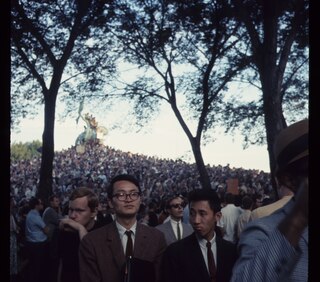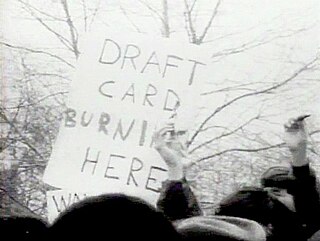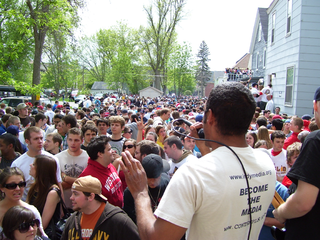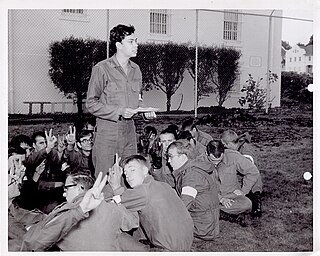 W
WThe Camden 28 were a group of Catholic left anti-Vietnam War activists who in 1971 planned and executed a raid on a Camden, New Jersey draft board. The raid resulted in a high-profile criminal trial of the activists that was seen by many as a referendum on the Vietnam War and as an example of jury nullification.
 W
WIn the 1960s, several "be-ins" were held in Central Park, Manhattan, New York City to protest against various issues such as U.S. involvement in the Vietnam War and racism.
 W
WProtest activity against the Vietnam War took place prior to and during the 1968 Democratic National Convention.
 W
WDraft-card burning was a symbol of protest performed by thousands of young men in the United States and Australia in the 1960s and early 1970s. The first draft-card burners were American men taking part in the opposition to United States involvement in the Vietnam War. The first well-publicized protest was in December 1963, with a 22-year old conscientious objector, Eugene Keyes, setting fire to his card on Christmas Day in Champaign, Illinois. In May 1964, a larger demonstration, with about 50 people in Union Square, New York, was organized by the War Resisters League chaired by David McReynolds.
 W
WThe Hard Hat Riot occurred on May 8, 1970 in New York City. It started around noon when more than 400 construction workers, and soon hundreds more, attacked more than 1,000 demonstrators affiliated with the Student strike of 1970 who were protesting the Vietnam War and other issues following the April 30 announcement by President Richard Nixon of the U.S. invasion of neutral Cambodia, and the May 4 Kent State shootings. The riot, first breaking out near the intersection of Wall Street and Broad Street in Lower Manhattan, led to a mob scene with more than 20,000 people in the streets, eventually leading to a siege of New York City Hall, and lasted more than three hours. More than 100 people, including seven policemen, were injured on what became known as "Bloody Friday". Six people were arrested, but only one of them was a construction worker associated with the rioters.
 W
WThe Kent State shootings, also known as the May 4 massacre and the Kent State massacre, were the killings of four and wounding of nine other unarmed Kent State University students in Kent, Ohio, by the Ohio National Guard on May 4, 1970. The killings took place during a peace rally opposing the expanding involvement of the Vietnam War into neutral Cambodia by United States military forces as well as protesting the National Guard presence on campus. The incident marked the first time that a student had been killed in an anti-war gathering in United States history.
 W
WThe Mifflin Street Block Party is an annual celebration held on Mifflin Street in Madison, Wisconsin, United States, which is held on the last Saturday of April. It is one of two large parties held in Madison, the other being the Halloween party on State Street. The party has typically featured local and out-of-state musical acts playing on house porches, balconies and backyard stages. The party has not had city sponsorship since 2012. Efforts by the university and the city to create competing events have been unsuccessful.
 W
WThe Moratorium to End the War in Vietnam was a massive demonstration and teach-in across the United States against the United States involvement in the Vietnam War. It took place on October 15, 1969, followed a month later, on November 15, 1969, by a large Moratorium March in Washington, D.C.
 W
WThe Vietnam War, also known as the Second Indochina War, and in Vietnam as the Resistance War Against America or simply the American War, was a conflict in Vietnam, Laos, and Cambodia from 1 November 1955 to the fall of Saigon on 30 April 1975. It was the second of the Indochina Wars and was officially fought between North Vietnam and South Vietnam. North Vietnam was supported by the Soviet Union, China, and other communist allies; South Vietnam was supported by the United States, South Korea, the Philippines, Australia, Thailand, and other anti-communist allies. The war, considered a Cold War-era proxy war by some, lasted 19 years, with direct U.S. involvement ending in 1973, and included the Laotian Civil War and the Cambodian Civil War, which ended with all three countries becoming communist in 1975.
 W
WPowe v. Miles, 407 F.2d 73, reversed a lower court decision, United States District Court for the Western District of New York, F.R.Civ. P. 65(a) (2), on an appeal of the court's decision that the District Court did not have jurisdiction on the case as Alfred University, the defendant, was a private institution.
 W
WThe Presidio mutiny, one of the earliest instances of internal military resistance to the Vietnam War, was a sit-down protest carried out by 27 prisoners at the Presidio stockade in San Francisco, California on October 14, 1968. The stiff sentences given out at court martials for the participants attracted international attention to the extent of sentiment against the war within the U.S. armed forces and the mutiny became "[p]erhaps the single best known event of the domestic GI movement".
 W
WStreet Scenes 1970 is an American documentary directed by Martin Scorsese. It documents two protest rallies against the Vietnam War that took place in May 1970: the Hard Hat Riot on Wall Street in New York City and Kent State/Cambodia Incursion Protest in Washington, D.C. The numerous camera operators do impromptu interviews with the protesters and the spectators. The New York protest turns violent as protesters were attacked by construction workers who supported the war. The Washington protest is peaceful. At the end, Scorsese, Harvey Keitel, Jay Cocks and Verna Bloom discuss the events and the current state of world affairs. Oliver Stone was one of the many camera operators.
 W
WThe student strike of 1970 was a massive protest across the United States, that included walk-outs from college and high school classrooms initially in response to the United States expansion of the Vietnam War into Cambodia. The strike began May 1, but increased significantly after the shooting of students at Kent State University by National Guardsmen on May 4. While many violent incidents occurred during the protests, they were, for the most part, peaceful.
 W
WUnited States v. Snider, 502 F.2d 645 (1972) was a case before the United States Court of Appeals for the Fourth Circuit. It was a consolidation of two separate cases: the first was a conviction for violation of 26 U.S.C. §7205, which prohibits submitting fraudulent tax information to an employer. The second was a conviction for violation of 18 U.S.C. §401, which prohibits "misbehavior ... as to obstruct the administration of justice."
 W
WProtests against the Vietnam War took place in the 1960s and 1970s. The protests were part of a movement in opposition to United States involvement in the Vietnam War, and as such took place mainly in the U.S.
 W
WTax resistance, the practice of refusing to pay taxes that are considered unjust, has probably existed ever since rulers began imposing taxes on their subjects. It has been suggested that tax resistance played a significant role in the collapse of several empires, including the Egyptian, Roman, Spanish, and Aztec.